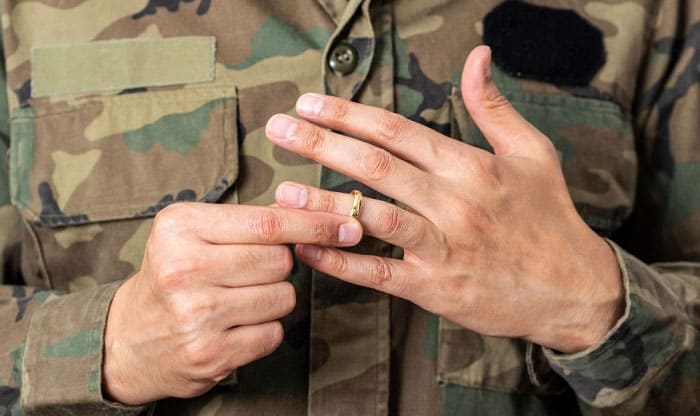Adultery is a crime that can happen in many places, including the military.
According to the Uniform Code of Military Justice (Article 134), it is when (1) a soldier has had sexual intercourse without someone, (2) the soldier or sexual partner was married at the time with someone else, (3) the soldier degraded the conduct of good order and discipline.
Note: Service members are subject to the Uniform Code of Military Justice (UCMJ), which is a federal law put in force by Congress.
If you just want to know how the military defines adultery, you can stop here. But if you want to know how to prove adultery in the military, you must continue to read. In this article, we will provide information on the military adultery investigation process and the steps to report infidelity in the military. So, make sure you read this until the end.
Table of Contents
Military Adultery 101 [Updated]
The Uniform Code of Military Justice (UCMJ) criminalizes adultery because
- Minimize the potential distraction and drama that ensues when affairs occur, which, in turn, may cause the performance of those involved and their coworkers to flunk.
- Augment the moral stature of leaders among other personnel in the Armed Forces.
Military Adultery Rules
- Adultery is now formally charged as Extramarital Sexual Conduct.
- So the offense is now gender-neutral and not restricted to certain types of sexual intercourse.
- Sexual intercourse, oral-genital, genital-genital, oral-anal, and anal-genital acts are all considered regardless of the sexual orientation of the two “actors” involved. It counts even if you are not married, but the other person is.
- Adultery is now only charged if it harms the good order and discipline of the military or brings discredit to the Armed Forces.
- Sexual conduct itself is no longer enough to be punishable.
Note: Here, “discredit” refers to injuring the Armed Forces’ reputation, bringing the service to disrepute or subjected to public ridicule, and/or lowering the services’ public esteem.
- Adultery can be “defended” if it happened while a marriage was pending legal separation or being legally dissolved.
- This includes any divorce proceeding, like filing a petition for divorce.
- But this defense has to apply to BOTH “actors” in sexual conduct.
Military Adultery Punishments
The maximum punishment for adultery is a dishonorable discharge. The discharged personnel cannot receive pay and allowances. Plus, he or she will be in confinement for up to a year.
However, most cases are not given the maximum punishment. Instead, they may be given an Administrative Disciplinary Action, an Administrative Separation, or a Court-Martial. The last scenario can mean brig time, rank reduction, pay forfeitures, and/or a punitive discharge.
Military Adultery Reporting Process
There are two options to report adultery in the military. The first is to ring up the accused’s commander to report. You can reach out to the Family Readiness Officer for the commander’s contact information.
However, because this can bring dishonor to the military unit, there is a high chance it won’t be persecuted and simply “swept under the rug” with an oral reprimand or a letter of reprimand from the commander to the accused.
Hence, if you intend to bring the accused out to the court, do not opt for this way of reporting. Instead, consider the following means.
File a petition for divorce. This is a public record document, so when you follow through with all of the processing, you will be able to officially “call out” your spouse having an affair while he or she is supposed to be serving the country. Also, check this guide to know more about military spouse divorce alimony!
But there are also some things you should think about before you report. Your spouses suffering from consequences can mean that you:
- He or she must forfeit pay – You may receive less for child support if you do have a child.
- He or she will be dropped down in ranks – You may receive less for child support as well.
- He or she will be dishonorably discharged – You lose military marriage benefits that you are entitled to as a military spouse, such as TRICARE.
Military Adultery Investigation Process
As mentioned earlier, the military considers three “elements” to determine if a case is an adultery or not. There must be evidence that:
- The accused engaged in sexual intercourse with a co-actor.
- The accused or co-actor was married to someone else when it happened.
- The act was to the military’s prejudice of good order and discipline or of a nature that discredits the military.
Although the first two are straightforward, the third is a bit more complicated. Other factors will be taken into account, such as:
- The marital status, rank, grade, and position of those involved
- The accused or the co-actor spouse’s military status and relationship to the military.
- The (potential) influence on the military unit and the military as a whole
- Including but not limited to negative consequences on the organization’s morale, efficiency, and teamwork.
- The ill-usage of government time and resources to consider the conduct
- The accompanying of other UCMJ violations
- Including whether the conduct continued despite orders to desist or counseling.
Only after careful considerations of these factors can the military decide if a case in an adultery case is worth persecuting.
One defense that can be put forward is the “Mistake of Fact”, which is when the “accused” has a reasonable belief that (1) the accused and co-actor were both single, (2) the accused and co-actor were both lawfully married to one another.
If this “Mistake of Fact” defense is raised with evidence, the military must look at the proof and make more careful considerations to determine if the “belief” was dishonest or unreasonable.
It’s not easy to prove adultery in the military. But it’s not impossible.
Now that you know the investigation process for adultery in the Army, you should have an idea of what evidence you must have to prove it successfully. Make sure that you address each and every area of consideration mentioned above.
A Notable (Public) Example
Before you leave this article, here is an example of adultery in the military. The “accused” and “found guilty” figure is former four-star rank, General David Petraeus.
He had an affair with biographer Paula Broadwell, but his case is still discussed “silently”. The debate is that his affair happened two months after he retired from the military. However, as retired officers are under the UCMJ for life, it is still possible to persecute Petraeus and strip him of his pension, which is $200,000 a year.
Find out more from this Youtube video from ABC News here.
Conclusion
With that, you have reached the end of this article on how to prove adultery in the military? Hopefully, this has been interesting and informative. If you liked this, please leave a comment! Also, you are welcome to ask questions or add your thoughts in the comments. Feel free to share this article’s content with other readers, such as your friends and family, as well. See you again!

I am Everett Bledsoe, taking on the responsibility of content producer for The Soldiers Project. My purpose in this project is to give honest reviews on the gear utilized and tested over time. Of course, you cannot go wrong when checking out our package of information and guide, too, as they come from reliable sources and years of experience.


